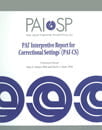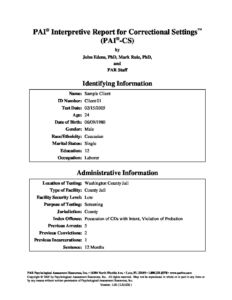
Personality Assessment Inventory (PAI) Correctional Reports Module [PAI-CS]
Provides assessment of offender misconduct risk, psychological needs and rehabilitation
For Ages: Adult
Administration Time: 50-60 minutes
Format & Scoring: Online administration and scoring via PARiConnect; Software scored and Hand scored
Authors: John F. Edens, PhD, Mark A. Ruiz, PhD, and PAR Staff
Online Forms, Reports, Kits & e-Manuals
Click to browse products
PC Software
Click to browse products
Printed Forms & Handscoring Materials
Test forms, response booklets and scoring reference manuals.
Printed Kits
Click to browse products
Printed Manuals
Click to browse products
PAI-CS Module Professional e-Manual
PAI-CS online Interpretive Report (each) min order 5
PAI-CS Module Counter Serial Number – Download (50 Uses)
PAI-CS Module Item/Response Booklets (25)
PAI-CS Module Kit – Download
PAI-CS Module Professional Manual
Description
Based on the PAI, the PAI-CS is a computer-generated interpretive report designed to assist correctional psychologists and staff in the management and treatment of offenders, with content based on empirical data and conceptual guidance derived from multiple sources. The PAI-CS was developed to address three primary goals: (a) to identify the possible risk of institutional misconduct that the offender poses during incarceration, (b) to describe the psychosocial needs of the offender, and (c) to estimate how the offender is likely to respond to incarceration and rehabilitative programs.
The PAI-CS differs from other computer-generated reports for the PAI in its exclusive focus on corrections issues. A unique Staff Management Summary is included to provide an integrated summary of the offender’s PAI profile in terms of their specific psychological functioning and institutional management factors.
Because individuals confined in correctional settings represent a unique population that is different, in many ways, from individuals within community or clinical settings, a separate offender sample was collected for the PAI-CS. The PAI-CS provides T scores based on both the PAI standardisation sample (N = 1,000) and the newly developed corrections normative sample (N = 1,155). Offender comparison profiles contrast the offender’s test scores with (a) the PAI community sample norms, (b) approximately 1,200 incarcerated offenders from multiple correctional facilities around the country, and (c) offenders of the same gender.
The PAI-CS may be administered either on-screen or using the Item/Response Booklet. The PAI items form 22 non-overlapping scales, including 4 scales for assessing response bias, 11 scales for assessing clinical syndromes, 5 scales for assessing treatment-related characteristics, and 2 scales for assessing interpersonal style.
The PAI-CS includes several experimental scales developed with the corrections normative sample data. In addition to the Addictive Characteristics Scale (ACS), which helps identify individuals at risk for substance use problems, two new validity scales have been developed to aid in identifying location-specific random responding. An additional validity scale is introduced to help identify inconsistent responding that is specific to correctional settings.
Reliability/Validity
- Internal consistency estimates for the Clinical scales range from .82-.92 in the corrections normative sample, .74-.94 in the community normative sample, and .82-.94 in the clinical sample.
- Test-retest correlations of the Clinical scales range from .79-.92 in a combined sample (N = 155) of community-dwelling adults and college students.
- PAI scale scores demonstrate significant relationships with disciplinary infractions and aggression among multiple offender samples.
- Validity studies demonstrate convergent and discriminant validity via correlations between PAI scale scores and more than 50 other measures of psychopathology.
Requirements
PAI-SP version 3.0 or higher; Internet connection
Sample Reports




